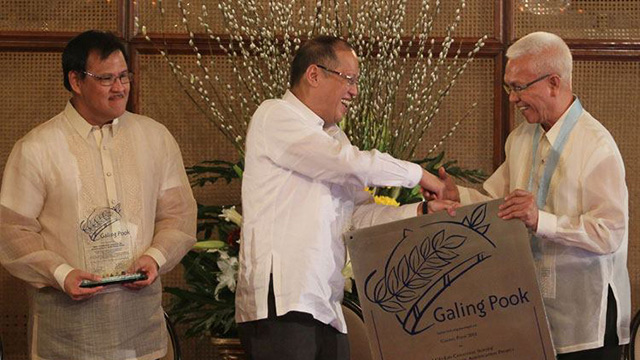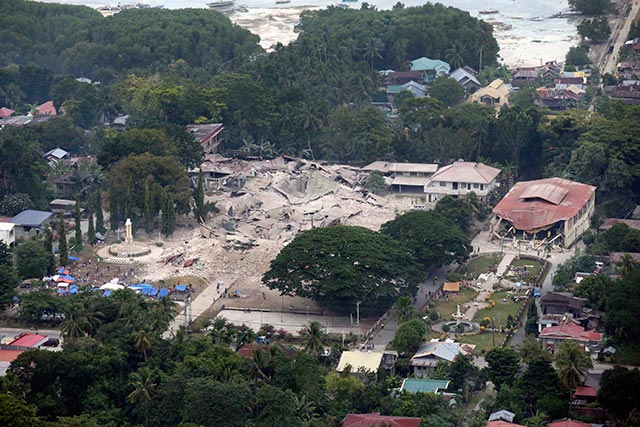SUMMARY
This is AI generated summarization, which may have errors. For context, always refer to the full article.

GENERAL SANTOS CITY, Philippines – He’s a priest, but this didn’t stop him from joining the communist underground to fight a dictator. Now that he’s mayor, the last thing he wants is to add to the problems of his constituents faced with the worst tragedy of their lives.
Leoncio Evasco Jr, mayor of Maribojoc town in Bohol, grabbed headlines recently after he drove away a Philippine National Red Cross (PNRC) team that was distributing relief goods to Maribojoc residents — victims of the 7.2-magnitude quake that hit Bohol and Central Visayas on October 15.
The former rebel priest, twice a political detainee during the dark years of Ferdinand Marcos’ martial rule, is now getting the flak for squabbling with PNRC chairman former Senator Richard Gordon and his team of volunteers.
Evasco has been criticized for using relief goods for political gain in his town of about 20,000 people, which suffered the brunt of the quake and was cut off from nearby towns for days. It took at least two days after the quake, on October 17, for PNRC relief goods to finally arrive in Maribojoc. (READ: Gov’t probes quake relief hoarding)
Online readers and local media wasted no time in vilifying Evasco — or Jun to friends from Mindanao where he spent more than half of his adult life. Social media can be unforgiving, but Evasco said he would rather focus on rebuilding Maribojoc.
The strong-willed, 69-year-old mayor said he has nothing against the PNRC, only the politicians behind it. “Of course it is being used by politicians like Gordon,” he said. “I have also served as director of Red Cross Davao City chapter for some time. I have nothing against Red Cross, but I am against their system because of some influence of the politicians behind it,” Evasco said in a Facebook comment posted on his behalf by his daughter-in-law Jasmin Delola-Evasco.
The mayor said they were distributing relief goods through a centrally coordinated system when the Red Cross team arrived in Maribojoc. He said he understands that the Red Cross has its own way of distributing relief goods. “But so do we (local officials),” he said in a phone interview with Rappler on Thursday, October 24. “We could have met halfway but they insisted on their own random distribution. The result is nagkagulo (bedlam). Everybody was lining up. There was no order,” he explained.
He asked the Red Cross to turn over the relief goods to the local government for “equitable” distribution, a system that he and the rest of town officials agreed upon when they convened the municipal risk reduction and disaster coordinating council immediately after the earthquake.
Clash
Red Cross refused. It then asked for a list of victims and reminded him of the Red Cross policy of “no list, no relief.”
Evasco told them providing the list was not the priority of local executives, since they continued to receive daily reports of casualties and injuries.
The mayor said the Red Cross proceeded with the distribution, which he said was disrespectful of the local government unit. One statement led to another and it eventually ended up with the mayor asking the volunteers to leave town.
The Red Cross volunteers have left, but Evasco stressed this doesn’t mean he’s closed his doors on them.
In an interview with TV5 on October 23, Gordon called Evasco a liar. “This guy (Evasco) was being utilized by somebody,” he said. Gordon did not elaborate. In the same interview, Gordon also told the mayor to spare the Red Cross. “Do not hit the Red Cross. If you get mad at me, do not hit the Red Cross,” the former senator added.
In a statement, the PNRC reiterated its policy to provide relief assistance “directly to beneficiaries of a disaster by our staff and volunteers and not through other organizations and entities such as the local government.” This was consistent “with our guiding principles of independence, neutrality and impartiality,” it added.
The Palace has kept its distance from the fight — and the irony. Gordon and Evasco, after all, campaigned under one political umbrella in the May elections: the opposition United Nationalist Alliance (UNA).

Faith, ideology
Evasco may have run and won as an opposition in Bohol, but he is hardly your typical politician.
He made a long journey back to his hometown in 2006 to fulfill a longtime dream of serving the town where he grew up. In 2007, he took his first shot at electoral politics, running for mayor and winning — despite his absence for 3 decades.
Evasco, after all, had the best of both worlds in a province known both for its deep Catholicism and revolutionary past. He was ordained a priest in Bohol. The province was also once a stronghold of the communist movement, which Evasco joined during martial law.
Against the powerful machinery of the Relampagos and later the Chatos of Bohol, Evasco won as mayor of his hometown. He has since won his two re-election bids, including the one in May this year when he ran under UNA. He is on his last term.
Before joining local politics, Evasco was among the hundreds of idealistic young men and women who went underground when Martial Law was declared in 1972. He was already an ordained priest then; he finished his college and seminary course at the Seminaryo Mayor de San Carlos in Cebu City in 1966 and 1970, respectively.
Evasco was twice arrested and detained for his involvement in the communist-led underground movement. His last arrest was in 1984, when he was officiating a wedding of comrades as a senior member of the Communist Party of the Philippines in the Southern Mindanao Region. He was detained in Davao City but subsequently released.
He may have left the priesthood but he was not defrocked; he simply is no longer allowed to perform priestly functions.
Duterte’s trusted aide
When Marcos was ousted in the 1986 EDSA revolt, Evasco found himself working for Rodrigo Duterte who was appointed OIC vice mayor of Davao City.
He was Duterte’s chief of staff and trusted aide when the latter become mayor of Davao City in 1988. He served the Duterte administration in various capacities until he decided to come home to Maribojoc for good in 2006 — even if it meant physical separation from his wife and two children who opted to stay behind in Davao City.
(Duterte personally handed a P1 million check to Evasco on Saturday, October 19. It was P500,000 more than what the Davao mayor had given the other devastated towns of Bohol. Evasco’s son also quit a high-paying job in the Middle East to assist the mayor in the rehabilitation of their devastated town.)
Evasco has been credited for making Maribojoc one of the better run local government units not only in Bohol but throughout the country as well.
Under his stewardship, Maribojoc was one of the 10 local government units to receive the Galing Pook award for 2011 for its Cadastral Survey and Simultaneous Systematic Adjudication Project. The project enabled 800 land owners to own titles to the land they have been occupying for decades and resolved long-standing boundary conflict with neighboring towns.
For two consecutive years, in 2010 and 2011, Maribojoc was conferred the Seal of Good Housekeeping by the Department of the Interior and Local Government under the late Secretary Jesse Robredo.
In December last year, long before the Red Cross controversy, he told Rappler that he will not be seeking any public office and will focus on current passion: propagating organic farming.
But for now, he’s helping rebuild his town. “A lot of civic and non-governmental organizations are coursing their assistance through us and we are seeing that these reach every affected family,” the mayor said.
And yes, the Red Cross can still come.
“We can agree on a mechanism on how to distribute relief goods coming from their end,” he added. – Rappler.com
Add a comment
How does this make you feel?
There are no comments yet. Add your comment to start the conversation.